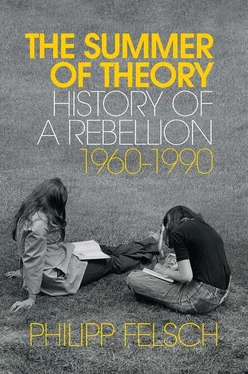At first, the critics of the paperback format saw its success as confirmation of their suspicions that people might buy paperbacks, but not read them. 44But the phenomenon also admitted the opposite interpretation: perhaps the affordable books were actually revolutionizing people’s reading habits; perhaps they were a medium for disseminating difficult ideas. Unseld, one of the optimists, commissioned the young luminaries of the West German social sciences to conceive another series that would serve this purpose. Jürgen Habermas, Hans Blumenberg, Dieter Henrich and Jacob Taubes were engaged as advisors and series editors to attune Suhrkamp’s academic catalogue to the zeitgeist. A few years later, Unseld added Niklas Luhmann to this circle. ‘The individual books should be formally appealing as well as inexpensive’, the editor Karl Markus Michel wrote to the professors in January of 1965, ‘and should be distinct both from the ubiquitous pocket books and paperbacks and from those traditional books that tend to crawl away and hide on bookshop shelves.’ 45The result, presented the following year at the Frankfurt Book Fair, was the Theorie series, whose minimalistic cover was the sober counterpoint to the candy-coloured, pop-art design of its older sister: the Suhrkamp culture’s White Album , so to speak, to follow its Sergeant Pepper . 46Of course, the Theorie series never became as successful as the edition suhrkamp . Not until the 1970s did its successor series reach a wider readership, the midnight-blue suhrkamp taschenbuch wissenschaft (that is, ‘Suhrkamp academic paperback’, or stw for short). 47The Theorie series can be credited with a different achievement, however: its title helped to establish a new genre.
That is not merely a retrospective observation: it was the editors’ intention. Their correspondence, preserved in the German Literature Archives in Marbach, reveals an ambition to give form to a new style of thinking which was not only in tune with the times, but practically inevitable from their view of history. In the sixties, scholars had still favoured the big stories. Jacob Taubes, for one, certainly did: his arguments as one of the Suhrkamp consultants followed eschatological patterns. ‘There is no doubt’, he informed Karl Markus Michel in 1965, ‘that philosophy today is lagging behind, condemned to “thinking back”. Ethnology, linguistics, psychoanalysis, literary theory, film theory, even archaeology and history are modes in which the new consciousness is trying to express itself.’ 48The verdict that philosophy was at an end, which Taubes had phrased more drastically elsewhere, was not based on the observation of business cycles in academic scholarship: Taubes saw it, rather, as an inevitable consequence of the legacy of Hegelian dialectics, which had staked out the horizons within which the human mind, ‘from Ionia to Jena’, might find itself. 49What came after it, in a society with division of labour, must necessarily take place between several disciplines. The committee of series editors cast about for a fitting name for ‘that field’. 50The ‘consciousness of the present’ that they wanted to capture called for a style of modern objectivity. 51Dieter Henrich tossed ‘Critique’, ‘Argument’, ‘Concept’ and ‘Diagnosis’ into the hat. 52Taubes proposed ‘Humanitas’, after the example of a series of books that he had conceived in the 1950s for Beacon Press of New York. 53The label that finally prevailed, however, as reflecting most of the participants’ ideas, was Theorie . One factor in the decision was no doubt the fact that the Parisian philosopher Louis Althusser had started a series called Théorie at Éditions Maspero in 1965. 54Legions of French readers, and still more German ones, have him to thank for crucial reading experiences.
To readers of theory, the distinction between theory and philosophy has always been important – although not always for the historical reasons that Taubes mentioned. Taubes himself noted another critical difference – the new series, he wrote in a memo to Unseld during a flight back from Paris, should dispense with the ‘professorial philosophy of philosophy professors’: ‘The field lies between philosophy (“indirectly”), ethnology and literature.’ 55On this point at least, Taubes knew he was in agreement with Adorno, who had also proclaimed the ‘time of theory’ in his 1965 lecture: both saw the academic orientation of philosophy as an obstacle to knowledge. For that reason, theory’s self-conception has been, since the days of the Frankfurt School, that of a counter-discourse – against the question of Being, against the curriculum, and against the systematic philosophizing that Adorno had encountered as early as 1958 in the form of the essay: ‘radical in its non-radicalism, in refraining from any reduction to a principle, in its accentuation of the partial against the total, in its fragmentary character’. 56Siegfried Unseld also insisted on publishing only short texts in the Theorie series. 57In the 1970s, Peter Gente would make even shorter forms a hallmark of Merve. Theory was evidently not just a type of content, but a whole new culture of books. The genre’s form corresponded with the potential of the paperback. 58
Referring to himself in a letter to Unseld as a ‘hunting dog’ for Suhrkamp, Taubes threw himself with zeal into the task of defining the intellectual profile of the new series. 59‘He’s always thinking of new things, among which there are no doubt many important, even necessary works’, Karl Markus Michel noted in 1965 after a meeting in Berlin. But he added that Taubes’s proposals not only needed supervision – ‘they are almost eager for supervision’. 60‘Theory’ in 1965 mainly meant critical social theory along the lines of the New Left, and the idea of Taubes’s that met with the greatest approval from Michel was Karel Kosík’s Dialectics of the Concrete , the manifesto of a humanistic materialism from the thaw of Czechoslovakia. But Unseld had intentionally put together a group of series editors with internal checks and balances. Dieter Henrich was worried that Suhrkamp might use the series that he co-edited as an ‘ideological forum’. 61‘All of that is indispensable’, he wrote to Unseld, who had set out for him what he understood by Enlightenment, ‘but is it everything? Enlightenment didn’t always come from “the left”. And when it did, often enough it was the adversary who had provoked the best arguments, or even supplied them.’ 62
How deeply the Suhrkamp culture had intervened in the intellectual economy of West Germany can be seen from the misgivings of Hans Blumenberg. To Karl Markus Michel, he remained ‘the great unknown’ of the four-man editorial board: ‘How will he react when we show him our planning? Will he reject titles like Kosík?’ 63In the event, Blumenberg was opposed at first, but his hostility to the project was general. The very prospect of being one of a group of series editors rubbed him up the wrong way: he had had too many bad experiences ‘with collective enterprises’, he intimated to Michel. A more serious impediment was his scepticism towards the development ‘of our publishing industry, which is more and more turning into a brand segment’. As late as 1965, the project of an academic paperback series was still met with resistance among German scholars. It was the indefatigable Jacob Taubes who hit upon the idea of recruiting Blumenberg not only as an editor but as an author. ‘Hans Blumenberg has almost finished a book with the title “The Legitimacy of the Modern Age”’, Taubes wrote to Unseld in April of 1965. ‘I would ask you to ring him as soon as possible. He has offers from traditional philosophy publishers. But I think we can commandeer the work for Suhrkamp.’ 64The swashbuckling metaphor was well chosen: as it happened, Blumenberg had to be coerced to publish with Suhrkamp. Although Taubes’s plan called for The Legitimacy of the Modern Age to appear not as a paperback, but in the regular academic catalogue, Blumenberg baulked. He had no intention of entrusting his work to a publisher with a ‘yet unspecified reception’, which he saw as the home of ‘the more rhetorical Enlightenment authors and the philosophical essayists’. 65To Karl Markus Michel, he expressed his trepidation ‘that the publisher might interfere in the preparation of the text and back matter for extraneous reasons’. 66Blumenberg’s self-image as a philosopher was incompatible with the project of harnessing intellectual goals to the needs of the audience.
Читать дальше












